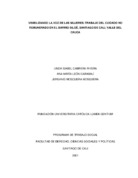Visibilizando la voz de las mujeres: trabajo del cuidado no remunerado en el barrio Siloé, Santiago de Cali, Valle del Cauca
Resumen
Históricamente, los estereotipos asignados culturalmente a cada género en la sociedad, guían el papel del hombre en su rol de proveedor y protector, y las mujeres encargadas de cuidar y educar; cuestión naturalizada al pasar de los años a causa del sistema capitalista dirigido por un modelo patriarcal.
Al asumir el rol de cuidadoras del hogar, las mujeres posponen sus proyectos de vida a fin de cumplir con las expectativas asociadas a dicho rol. En esta investigación se abordaron las teorías feministas, y de la economía del cuidado, dada su pertinencia para comprender las construcciones socio-culturales sobre el cuidado. Por ello, se implementó un enfoque cualitativo a través del método narrativo con la técnica de entrevista semiestructurada a cuatro mujeres residentes de Siloé en la ciudad de Cali y la revisión bibliográfica, esto posibilitó analizar los significados sobre el trabajo doméstico no remunerado y de cuidado, para contribuir al reconocimiento y visibilización de los aportes de las mujeres en la sociedad. Como hallazgos, se evidenció que el tiempo para el autocuidado es escaso, además los sentimientos y emociones que influyen de manera significativa en sus vidas y en el cuidado, generando conciencia frente al rol de la mujer en la sociedad.
Abstract
Historically, the stereotypes culturally assigned to each gender in society, guide the role of men in their role of provider and protector, and women in charge of caring and educating; an issue naturalized over the years due to the capitalist system led by a patriarchal model.
By assuming the role of caregiver, women postpone their life projects in order to fulfill the expectations associated with this role. In this research, feminist and care economy theories were addressed, given their relevance to understand the socio-cultural constructions of care. Therefore, a qualitative approach was implemented through the narrative method with the semi-structured interview technique with four women residents of Siloé in the city of Cali and the literature review, which made it possible to analyze the meanings of unpaid domestic work and care, to contribute to the recognition and visibility of the contributions of women in society. As findings, it was evidenced that time for self-care is scarce, in addition to the feelings and emotions that significantly influence their lives and care, generating awareness of the role of women in society.
Colecciones
- Trabajo social [101]

